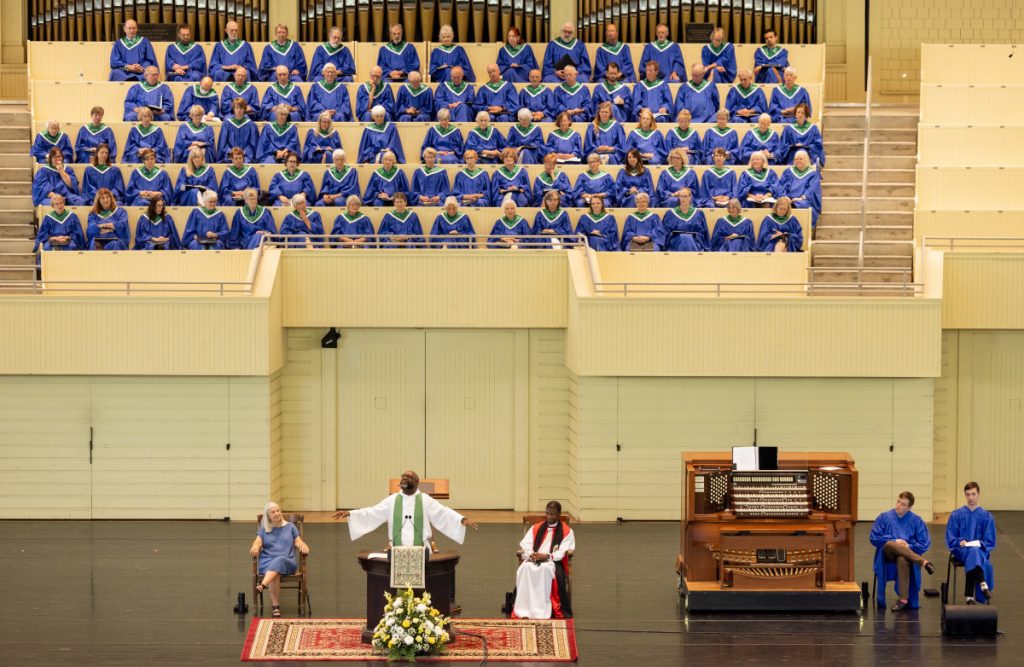
Column by Mary Lee Talbot
“The theological word ‘universalism’ strikes fear in the hearts of those who know they are right,” said the Rev. William H. Lamar IV. He quoted part of the scripture lesson for the day “… and there was a multitude that no one could count, from every nation, from all tribes and peoples and languages … robed in white … and crying ‘salvation belongs to our God.’ ”
Lamar preached at the 9:15 a.m. Wednesday morning worship service in the Amphitheater. The title of his sermon was “Universalism?” and the scripture reading was Revelation 7:1-14.
Before he began to preach, Lamar called out the names of his ancestors: Gladys and Arthur, Henry and Sally, George and Lessy, George and Nancy, and William and Bessy. “They are the saints who bequeathed the love of God and humanity to me. I stand because of them and who I am because of them.”
It is without dispute, he said, that we are technologically sophisticated people. There are libraries in our phones, he told the congregation.
“We can call London as easily as Los Angeles; Birmingham, Alabama; or Birmingham, United Kingdom. DoorDash brings dinner, Instagram brings our groceries, Waze tells us where to turn,” Lamar said. “Smart watches monitor our blood pressure and count our steps every day. But how many steps have we taken as human beings toward moral and ethical maturity? Do we see everyone as children of the imago dei, without exception? Do we treat people with dignity, grace, mercy and justice?”
The human technological report card is admirable, but our moral and ethical report card is inadequate. “We have to graduate from war and oppression or we are doomed to repeat the same class. I believe we are smart people, but we lack wisdom — what my mentor Frank Anthony Thomas calls the wisdom of the ages,” Lamar said.
John the Revelator, as Lamar called him, saw that the destinies of the conservative and progressives, the rich and the poor, cannot be unraveled. If you pull the string, the garment of humanity will unravel. “The fires in Hawaii portend a Chautauqua on fire.”
In John’s vision, when the sixth seal on the scroll was opened, an earthquake occurred. The Four Horsemen of the Apocalypse “gallop because of us, but with the sixth seal a natural disaster happens and the stars fall,” he said. “Kings and the rich, slave and free hid in caves and begged the stones to fall on them and hide them from the wrath of the Lamb.”
Lamar told the congregation, “the Lamb and the one on the throne are not neutral when we destroy the earth. The Holy Spirit labors to open our eyes. John sees clearly, coldly and truthfully. If we don’t learn we belong to one another in a time of peace, we will all perish together — and that day is closer than it has ever been.”
He continued, “We are smart, but we lack wisdom. We will live together or die together. Where is the music of hope and possibility?”
People abandon hope when they believe God will fix the problem one day. “We abdicate responsibility and we are morally bankrupt. We need to speak about perseverance and labor. We still hold on to the vocabulary of hope but have the melody of peace and love left us?” he asked.
Lamar, after dining on a shrimp taco at Taco Tuesday at 2 Ames, was irresistibly drawn to the Amp, like the moon pulls the tide.
“I was entranced by the beauty of what I heard and then saw,” he said. “There were humans playing every kind of instrument, building a musical and muscular sweat that dripped from their bodies. The elbows of Roderick Cox, the conductor who lights up podiums around the world, flew. By the way, we were both born in Macon County, Georgia.”
He continued, “I wish I could do what Roderick does.” A voice from the back shouted: “You do.”
Lamar said, “Cox coaxed beauty out of every musician, every instrument. I closed my eyes and saw another conductor – the Lamb – who is in the midst of drawing us to new music in a new fellowship where no one is left out or left behind.”
The Lamb in Lamar’s vision was at the podium conducting people from every tribe, nation and language, dressed in white robes, singing “salvation belongs to God. Not to Christians, Jews, Muslims or Hindus. Salvation belongs to God and the one who conducts.”
In his vision, John asks an elder: “Who are all these people?” The elder says, “They are the people in the midst of an age of war and death who beat their swords into plowshares, who studied war no more. They are sheltered by God and they hunger and thirst no more. The shepherd of joy wipes away every tear.”
Lamar said to the congregation, “We will all be saved when the music the Lamb conducts is sung in our hearts, by every instrument played in every tribe and nation. We will all be saved, not some — all.”
Melissa Spas, vice president for religion at Chautauqua Institution, presided. Deborah First, a year-round Chautauquan who has worked with Fr. Greg Boyle to bring Home Boys and Girls to Chautauqua, read the scripture. The prelude, by Pamela Decker, was “Veni Creator Spiritus,” played by Nicholas Stigall, organ scholar, on the Massey Memorial Organ. The anthem, sung by the Motet Choir, was “O How Glorious,” music by Philip Stopford and text from Revelation 7:9, paraphrased by Basil Harwood. The choir was conducted by Joshua Stafford, director of sacred music and Jared Jacobsen Chair for the Organist and accompanied by Stigall. The postlude, played by Stafford, was “Sine Nomine,” by John Weaver. Support for this week’s chaplaincy and preaching is provided by the Alison and Craig Marthinsen Endowment for the Department of Religion.




